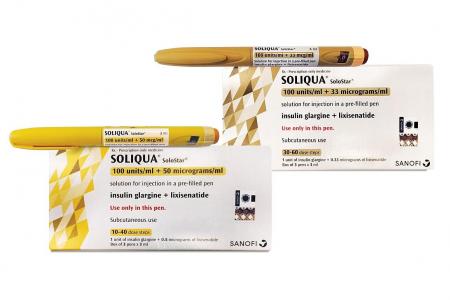First-of-its-kind drug for Type 2 diabetes
Soliqua can lower blood sugar within days
For adults suffering from uncontrolled Type 2 diabetes, help is at hand with what is touted to be the most effective solution in the market.
Being launched in Singapore in conjunction with World Diabetes Day today and available at public and private hospitals here, Soliqua is a once-daily injectable prescription treatment that aims to relieve the condition in one step.
It combines two types of diabetes drugs, insulin glargine and lixisenatide, which have complementary mechanisms and work by copying the functions of the natural incretin hormones in the body to help lower both fasting and post-meal blood sugar levels.
Dr Matthew Tan, from Diabetes and Endocrine Care at Farrer Park Hospital, told The New Paper: "This hybrid medication can be used to complement oral diabetes treatment options like metformin to help the patient achieve excellent results in diabetes and metabolic control."
ADJUSTABLE DOSING
Dr Ben Ng, an endocrinologist from Arden Endocrinology Specialist Clinic at Mount Elizabeth Novena Specialist Centre, said Soliqua is a powerful agent that is both rapid and effective.
After just one injection, it can help lower a patient's blood sugar within two to three days and reduce the risk of complications.
He told TNP: "It has easily adjustable dosing to help patients reach their target blood sugar levels, as set by their doctor.
"As diabetes rates continue to rise, we are not going to win the war against diabetes quickly. By helping patients take control of their diabetes, it can help improve their quality of life and reduce the risk of long-term complications such as stroke, kidney failure and heart disease."
With the number of people suffering from the condition estimated to grow to one million in 2050, Dr Khoo Chin Meng, the head and senior consultant of the division of endocrinology at National University Hospital, said the Ministry of Health declared a war on diabetes in 2016 to rally a whole-of-nation effort to reduce the burden of diabetes on the population.
The cost burden from diabetes is expected to rise from about $940 million in 2014 to $1.8 billion in 2050.
Dr Khoo told TNP: "Diabetes is the major cause of non-traumatic lower limb amputation, adult blindness and end-stage kidney failure requiring long-term dialysis. (Number of) life years lost due to mortality and ill health related to diabetes was the fourth largest among all diseases in 2014."
At least one in three people with diabetes have uncontrolled diabetes, where a patient's blood sugar level remains high despite being on treatment.
Dr Khoo noted that there are many reasons for this. They include not using enough medication, not following the eating plan, being inactive, having an illness or infection, or using certain medication that might worsen diabetes.
While Soliqua has been shown to be safe and effective in clinical trials, it is advisable for patients to consult their doctors beforehand to assess their suitability.
Those under 18 and those with Type 1 diabetes or liver diseases should avoid the treatment.
As with any medication, there may be side effects which vary from person to person.
Soliqua's most common ones are mild and transient, including low blood sugar (hypoglycemia) and gastrointestinal reactions (nausea, vomiting and diarrhoea).
Dr Tan said: "Most of these side effects may go away within a few days or a couple of weeks. If they are more severe or do not go away, you will need to talk to your doctor."
Get The New Paper on your phone with the free TNP app. Download from the Apple App Store or Google Play Store now



